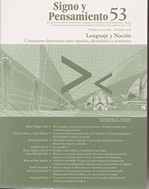Abstract
With this issue, the editors proposed a double objective: on the one hand, we were very interested in showing the connections between the social sciences, communication and language studies; on the other, to analyze in some detail a constellation of common concepts related to the spatial issue and the formation of identities around the concept of nation.
The social sciences have been struggling in recent times to show how the territory and, more generally, the space itself is not something given once and for all, nor something that functions as a mere container or receptacle of social life, but rather which are an active and shaping part of this. To reach this point it has been necessary to go a long way in theoretical reflection. In the first place, it was necessary to denaturalize strongly entrenched categories in the socio-political imaginary, such as territory, border, place and, even, the idea of the body (the border of the self). In the second place, it has been necessary to avoid very hasty conclusions such as the one that proclaims the death of space in favor of processes of economic and cultural globalization on the planet, which would erase all distinctions and particularities.
Herrera, D. (edit.), (2007), (Des) territorialidades y (no) lugares, Medellín, Instituto de Estudios Regionales.
This journal is registered under a Creative Commons Attribution 4.0 International Public License. Thus, this work may be reproduced, distributed, and publicly shared in digital format, as long as the names of the authors and Pontificia Universidad Javeriana are acknowledged. Others are allowed to quote, adapt, transform, auto-archive, republish, and create based on this material, for any purpose (even commercial ones), provided the authorship is duly acknowledged, a link to the original work is provided, and it is specified if changes have been made. Pontificia Universidad Javeriana does not hold the rights of published works and the authors are solely responsible for the contents of their works; they keep the moral, intellectual, privacy, and publicity rights.
Approving the intervention of the work (review, copy-editing, translation, layout) and the following outreach, are granted through an use license and not through an assignment of rights. This means the journal and Pontificia Universidad Javeriana cannot be held responsible for any ethical malpractice by the authors. As a consequence of the protection granted by the use license, the journal is not required to publish recantations or modify information already published, unless the errata stems from the editorial management process. Publishing contents in this journal does not generate royalties for contributors.


